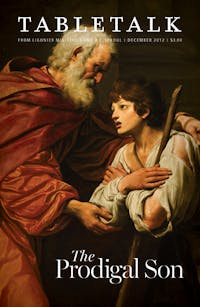
Request your free, three-month trial to Tabletalk magazine. You’ll receive the print issue monthly and gain immediate digital access to decades of archives. This trial is risk-free. No credit card required.
Try Tabletalk NowAlready receive Tabletalk magazine every month?
Verify your email address to gain unlimited access.
Determining the church’s intersection of and proper degree of engagement with the culture is something that the church has been wrestling with for centuries now. Judging by the number of books on this topic that continue to roll off the presses, it is something she will continue to wrestle with for a long time to come. Perhaps this isn’t all bad news. It is the nature of our pilgrimage not to know everything. As pilgrims, we confess we are going somewhere and at the same time that we have not gotten there yet.
Few areas provide opportunity for reflection upon the church’s engagement with the culture more than the institution of marriage. The reason for this is that marriage is not something on which the church has a monopoly. Christians and non-Christians, like those living in the days of Noah, eat and drink, marry and are given in marriage (Matt. 24:28). Like the temptation that Paul refers to, marriage is something that is common to all humanity (1 Cor. 10:13). It is part of our culture and not something distinctly Christian. It began before the fall and is thus numbered with the creation ordinances of Sabbath and labor. James F. White gets at this in his description of Christian wedding services:
There are few, if any, occasions more joyful than a wedding. Yet the church’s approach to weddings has been a slow and cautious one, always willing to leave most of the festivities outside the church door. Even now the wedding service is a curious amalgam of Christian and pagan elements. The words are an unlikely match of liturgical language and legal jargon. The minister serves as both pastor and civil servant, subject to the canons or laws of both ecclesiastical and civil societies. Weddings are a strange combination of Christ and culture.
John Calvin makes a similar point in his polemic against marriage as a sacrament when he compares it to the ordinary vocations of life: “Marriage is a good and holy ordinance of God; and farming, building, cobbling, and barbering are lawful ordinances of God, and yet not sacraments.”
All of this is helpful for explaining why pagans can have good, healthy, strong, culture-making, and society-contributing marriages. To deny this, one also has to deny that those outside the church are capable of good, healthy, strong, culture-making, and society-contributing vocations.
Common critiques of contemporary marriage in the West often include the recognition that marriage has become too sentimentalized. In light of Calvin’s comments, I wonder if the church isn’t guilty of making marriage too spiritual. That’s not to say that there aren’t Christian ethics that relate to marriage. Of course there are. Moreover, that isn’t to say that there aren’t opportunities to model and display the gospel in marriage. There are. But even when Paul speaks of the great mystery of marriage because it refers to Christ and His church, his proof text is Genesis 2:24: “Therefore a man shall leave his father and mother and hold fast to his wife, and the two shall become one flesh,” a text universally considered to be referring to the institution of marriage in general and not Christian marriage specifically. Marriage—Christian marriage and non-Christian marriage—point to the gospel.
Is it possible that our over-spiritualization of marriage can be seen in the number of Christian books that come out on this subject? On my desk, I have two new ones I am told are must-reads, not to mention the shelf full of others I already have. I am constantly wondering if I should require a different book for the couples in my premartial counseling— something newer, more relevant and up to date. The author of one new book on the subject says that he read all or part of 187 books on the subject in preparation to write his tome, and that most were written for and by Christians. I haven’t looked into it, but if I had to guess, I would bet that most of those were written in the last century.
Is it possible that our over-spiritualization of marriage is evidenced by the number of retreats and conferences offered and attended on this subject by Christians? Is it possible that our over-spiritualization of marriage can be seen by the number of series on the topic that fill our pulpits?
Here’s the point. I wonder if we have made marriage more difficult than it really is. I wonder if this is why couples who come to me for premarital counseling are scared to death that they are not going to be ready and that failure is inevitable.
Maybe it’s time for us to bring the institution of marriage back to earth. Maybe it’s time for us to realize that in this institution we serve God and our neighbor. Maybe it’s time we recognize that we are members of Christ and culture. And just maybe, in bringing marriage back to earth, we might come to realize that marriage really isn’t all that hard. We might just find that God will bless our marriages and use them to build and shape the culture and as a stage upon which to magnify His grace.
